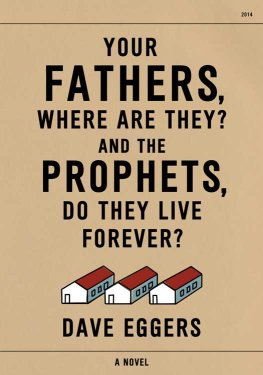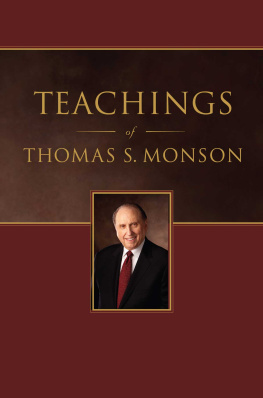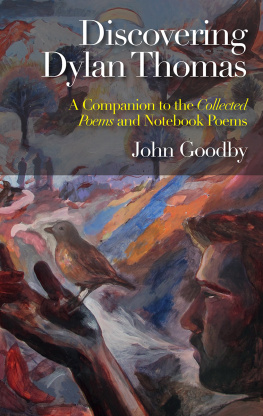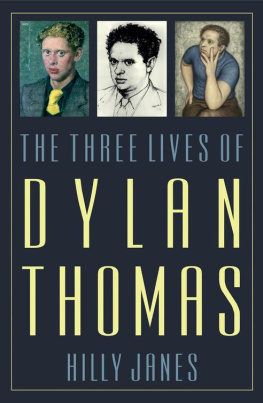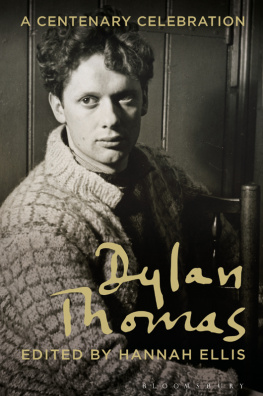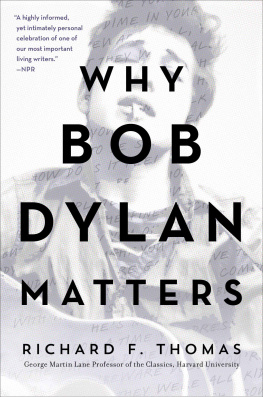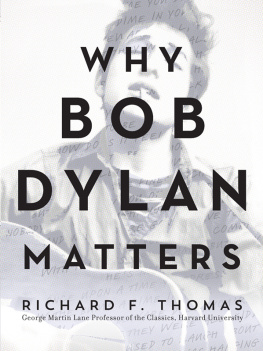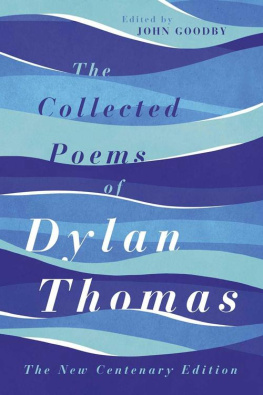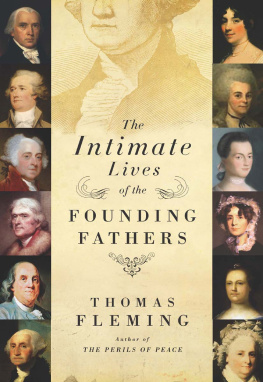Aeronwy Thomas - My Fathers Places: A Memoir by Dylan Thomas Daughter
Here you can read online Aeronwy Thomas - My Fathers Places: A Memoir by Dylan Thomas Daughter full text of the book (entire story) in english for free. Download pdf and epub, get meaning, cover and reviews about this ebook. year: 2010, publisher: Skyhorse Publishing, genre: Non-fiction. Description of the work, (preface) as well as reviews are available. Best literature library LitArk.com created for fans of good reading and offers a wide selection of genres:
Romance novel
Science fiction
Adventure
Detective
Science
History
Home and family
Prose
Art
Politics
Computer
Non-fiction
Religion
Business
Children
Humor
Choose a favorite category and find really read worthwhile books. Enjoy immersion in the world of imagination, feel the emotions of the characters or learn something new for yourself, make an fascinating discovery.
- Book:My Fathers Places: A Memoir by Dylan Thomas Daughter
- Author:
- Publisher:Skyhorse Publishing
- Genre:
- Year:2010
- Rating:3 / 5
- Favourites:Add to favourites
- Your mark:
- 60
- 1
- 2
- 3
- 4
- 5
My Fathers Places: A Memoir by Dylan Thomas Daughter: summary, description and annotation
We offer to read an annotation, description, summary or preface (depends on what the author of the book "My Fathers Places: A Memoir by Dylan Thomas Daughter" wrote himself). If you haven't found the necessary information about the book — write in the comments, we will try to find it.
My Fathers Places: A Memoir by Dylan Thomas Daughter — read online for free the complete book (whole text) full work
Below is the text of the book, divided by pages. System saving the place of the last page read, allows you to conveniently read the book "My Fathers Places: A Memoir by Dylan Thomas Daughter" online for free, without having to search again every time where you left off. Put a bookmark, and you can go to the page where you finished reading at any time.
Font size:
Interval:
Bookmark:


Constable & Robinson Ltd
3 The Lanchesters
162 Fulham Palace Road
London W6 9ER
www.constablerobinson.com
First published in the UK by Constable,
an imprint of Constable & Robinson, 2009
Copyright Aeronwy Thomas, 2009
The right of Aeronwy Thomas to be identified as the author of this work has been asserted by her in accordance with the Copyright, Designs and Patents Act 1988
Extracts from letters taken from Dylan Thomas:
The Collected Letters, edited by Paul Ferris,
published by J.M. Dent, 1985.
All rights reserved. This book is sold subject to the condition that it shall not, by way of trade or otherwise, be lent, re-sold, hired out or otherwise circulated in any form of binding or cover other than that in which it is published and without a similar condition including this condition being imposed on the subsequent purchaser.
A copy of the British Library Cataloguing in Publication Data is available from the British Library
ISBN 978-1-84901-005-4
Printed and bound in the EU
1 3 5 7 9 10 8 6 4 2
To Huw, Hannah and Oscar

Dylan before Laugharne, with Aeron and an unknown man in front of the greenhouse.
(Photo courtesy of Reg Evans).
W e were met at Carmarthen station by Billy Williams of the Williams family who owned and ran the electric generator, the buses, taxis and garage at Laugharne as well as the Browns Hotel. My father, Dylan, my mother, Caitlin, and I piled in to his family taxi with our higgledy-piggledy set of suitcases and belongings. Basic furniture from the Manor House, mainly given by Maggs (my fathers patron, Margaret Taylor) and well-wishers, was being sent separately while Mother was forced to leave behind my cradle, her round table and the magnificent double bed from the Chelsea studio.
The taxi took us along the cliffwalk to the path that led to Cliff House. At the top of the path, by an old iron gate, a clump of daisies radiated their whiteness and, although we were driving past, time seemed to stop. I can remember arriving on that first day, carrying our bags and hand-held belongings, toiling down the path from the walk above the Boat House. The pathway to the Boat House was too narrow for a car so we carried our bags over the uneven surface while we looked over the low cliff wall at the sand and water beyond. The overhanging bushes and hanging plants clung to the cliff-face like festoons waving a greeting. We walked, laden with bags and books, along the last stretch of the path, rough and natural under our feet, to our new home, a three-storeyed cottage called the Boat House.
It looked heavenly: a place to explore, to run around, where we would be living forever. It had verandas and balconies, water-butts, stepped gardens, a large boat shed in the back yard, the harbour and a wall protecting us from the wilds of the friendly estuary beyond. We had fallen upon paradise. As we were settling in, my father wrote to Margaret Taylor, who had arranged for the place, that, this is it: the place, the house, the workroom, the time and that he could never thank her enough. I shall write in this water and tree room on the cliff, every word, will be my thanks to you...

The Boat House.
(Photo courtesy of Colin Shrewing).
In my memory it hardly ever rained that season. From the balcony that ran round the cottage like a midriff, on two sides of the house, I looked at the river estuary and beyond the view of Laugharne. There was sun on the water and rivulets threaded their way through drifts of sandbanks and tidal flats away from the coast with its mudflats, channels and moored fishing boats under the castle walls, and the square and hill where my mother and father used to live in the thirties in a small fishermans cottage called Eros. On the crest of the hill was the council estate of Orchard Park. There was sun on the water. Straight away, Mother found a mothers help in the village: a young woman called Dolly Long. When I knew Dolly she must have been in her twenties, with a stock of floral, Vera Lynn dresses. She wore her black hair long and lank over her narrow shoulders; her face was thin and stricken. She was, after my mother and of course Granny, the most beautiful, radiant person I ever knew. She belonged to our childs world more than to Mothers world, warning us whenever anyone descended to our kitchen haunts with, Now were for it!
Dolly soon had an array of faces for Booda, a fixture in the kitchen. He was what was termed then as deaf and dumb, though the noise he made when trying to express himself with gestures and movements was impressive. Yet as children we never once mimicked Booda; he was one of us, part of the underworld away from the proper adults upstairs.
He was our nearest neighbour and lived in the Ferry House, a house built on a rock at sea level. He was the survivor of three brothers, the Roberts, who ferried passengers between Laugharne and the Llangain peninsula. The other two had died. We could see the bell house just across the water which you rang when you wanted a ride. Poor Booda did not hear any of these calls and only occasionally took in his boat those people who caught his attention outside his house.

On the Lawn: Dolly and Llewelyn in the foreground.
W e had arrived in May and by the summer it was possible to bathe on the mud and sandbanks when the tide was out. We would pack up sandwiches, chocolate, hankies, thermoses, towels and Mothers tobacco tins into an open wicker basket and visit the nearby lawn a patch of grass beside the sea about five minutes walk along the shore. Mably, our dog, would join us uninvited for our walk. He had belonged to Granny and Grandpa Thomas originally, rescued from their former home at Blaencwm, but knew where his loyalties lay. This transfer was confirmed by a change in the dogs name; Mably Owen was a friend of my parents and probably not known to my grandparents. He took to his new identity immediately, abandoning his first owners and moving to the Boat House, where there was no time to become bored and always someone swimming, walking or cycling with a dog for company. Mother and I walked past the Ferry House along the coastal shore at low tide towards the lawn, clambering across boulders and slipping on mud in sandals and plimsolls. We used the seaweed carpet draped over the stones to walk over the slippery mud, stretching our legs from rock to rock. Mably took his own route, crying when his calloused paw hit a stone under the mud.
Beside the lawn there was what looked like a tiny, ruined chapel, with only three of its walls in place, where we would sit to take our clothes off and put on our swimsuits ready for a dip. When Mother realized that no one ever visited the lawn except us, she used to slip off her suit to swim with nothing on. I would object loudly, imagining eyes peering from all the bushes growing across the cliff-face. The lawn, built on an elevated ledge surrounded by a curving, crescent-moon-shape wall, was bare of any shrubbery. On emerging from the water, my swimsuit weighed me down so that I bagged like a small bloated whale. Mother would rush to the chapel, dive into the basket, emerging with chocolate before remembering to cover herself with a threadbare towel. Afterwards, I had to dry her back. Damp but fortified, we would climb over the lawn edge to sit squat-legged, eat our sandwiches and drink black tea. Mother would place the baccy tin between her knees and select strands of tobacco to roll a cigarette with one hand against her hip.
Next pageFont size:
Interval:
Bookmark:
Similar books «My Fathers Places: A Memoir by Dylan Thomas Daughter»
Look at similar books to My Fathers Places: A Memoir by Dylan Thomas Daughter. We have selected literature similar in name and meaning in the hope of providing readers with more options to find new, interesting, not yet read works.
Discussion, reviews of the book My Fathers Places: A Memoir by Dylan Thomas Daughter and just readers' own opinions. Leave your comments, write what you think about the work, its meaning or the main characters. Specify what exactly you liked and what you didn't like, and why you think so.


